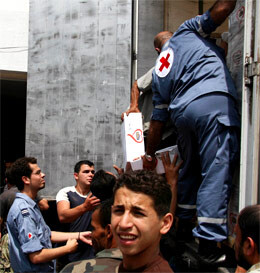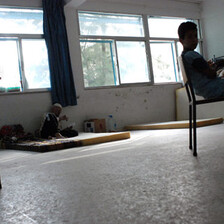Electronic Lebanon 24 May 2007

The International Committee of the Red Cross (ICRC) on Wednesday distributed food parcels to last five days for 3,000 people at a relief point for those displaced by the siege on Nahr al-Bared. (Hugh Macleod/IRIN)
Ashraf Abu-Khorj, a camp resident, spoke to IPS in the middle of the shelling on the second day of fighting. Khorj said that the situation was growing increasingly dire, as he and his neighbours felt that no one was acting to put an end to the situation peacefully.
“There is no water. The food supplies are decreasing. People can’t leave the camp. People were not expecting this to happen. We are unprepared. Our neighbour was killed, and he is still in the room and his body is starting to smell within the house.”
Khorj added, “The camp is one square kilometre in size. And if you can imagine 35,000 people living in a place this small while their homes are being bombed. The situation is very bad.”
Over the last three days, the Lebanese Army has been pounding the camp relentlessly with artillery rounds and tank fire. With a camp this densely populated, human rights groups have pleaded with the Lebanese government to recommit to a more peaceful means of dealing with Fatah al-Islam.
Al Jazeera bureau chief in Beirut, Ghassan Ben-Jedo, said during a television interview on Tuesday that the Lebanese government and the main Palestinian political groups working in the Palestinian refugee camps in Lebanon were united in their opposition to Fatah al-Islam.
“The talk was to end the conflict, but not commit violations against civilians,” Ben-Jedo said.
The fighting was touched off in the northern coastal city of Tripoli on Sunday when the Lebanese Internal Security Forces, ISF, raided a house believed to have been the hideout of suspects in a bank robbery committed in the nearby town of Amyoun on Saturday.
Sources in Tripoli say the gun battle quickly escalated to massive street fighting between the ISF and the well-armed gunmen believed now to be members of Fatah al-Islam. The Lebanese Army was called in after members of the group stormed army installations on the outskirts of the Naher al-Bared refugee camp 16 km north of Tripoli.
The Lebanese Army controls most of the positions around the camp now, but this has been at a heavy cost. Official sources estimate that at least 30 people from the Lebanese security forces have been killed in the fighting so far.
Although there are no clear numbers, at least 15 Fatah al-Islam members have been killed, with some reports circulating that at least some of those killed were Lebanese Sunni fighters and foreign fighters — possibly even Afghanis or Saudis.
Fatah al-Islam has turned back numerous attempts to deliver aid supplies and water to the residents of Nahr al-Bared. On Tuesday, a United Nations Relief and Works Agency convoy was attacked as they entered the camp, although it is not clear who was responsible.
Few aid organisations are willing to risk entering the camp to deliver much-needed medical and food supplies if safe passage cannot be guaranteed, worsening the already dire conditions for those living in Nahr al-Bared refugee camp.
Meanwhile, Palestinians in other refugee camps began burning car tires late Tuesday afternoon because of what many analysts say is a growing discord among Palestinians in Lebanon concerning the Lebanese Army’s tactics in trying to deal with Fatah al-Islam.
Speaking from the al-Beddawi Palestinian refugee camp near Tripoli, Sultan Abul Ainain, head of the mainstream Fatah faction said, “If the random shelling does not stop in the Nahr al-Bared camp there will be uprisings in all the camps in Lebanon.”
“No Palestinian or Palestinian faction in Lebanon will accept seeing the Palestinian people slaughtered in a collective punishment as is happening in Nahr al-Bared,” he said. The International Committee of the Red Cross said that at least 32 people have died in the Tripoli area since fighting began. There are no clear numbers as to how many Palestinians have died in the camp itself.
A brief ceasefire on Monday afternoon allowed for the Palestinian Red Crescent Society to evacuate 17 wounded from the camp. Another 10 were evacuated on Tuesday, and on Tuesday night, some 2,000 residents streamed out of the camp during a lull in the fighting.
But information is limited from within Nahr al-Bared as residents have been trapped inside their homes and around mosques for fear of being hit by artillery fire coming from the Lebanese Army or from sniper fire from Fatah al-Islam.
Over the last three days, Palestinian religious leaders had sent repeated calls to the Lebanese Army to stop the shelling of the camp in order to avoid further civilian casualties.
In a television interview with al-Jazeera during a period of intense shelling late Tuesday morning, Sheikh Lababidi, a Sunni Palestinian religious leader, made an appeal on behalf of the camp residents.
“Everyone, ourselves included, has spoken out against the attacks on the (Lebanese) Army. But who is saying no to the Army’s assault? Are the people in the camps mosquitoes? The Palestinians have spoken out against Fatah al-Islam. Why are they being massacred?
“Let the wise speak up. There are a thousand ways to stop Fatah al-Islam. This is not the way,” Lababidi said.
Adding to the violence, two bombs rocked Sunni Muslim and Christian districts of Beirut on Sunday and Monday. Although statements claiming responsibility for the bombings were sent to news agencies by someone claiming to represent Fatah al-Islam, the group’s spokesperson, Abu Salim, denied the group was responsible. But, Fatah al-Islam has issued statements saying that if the Lebanese government did not halt its assault on the camp, it would widen the conflict to areas “outside of Tripoli.”
Before the fighting began, Prime Minister Fouad Siniora’s U.S.-backed government was already in the throes of a political crisis. The political opposition, led by the Shia party Hezbollah, began demonstrations last December demanding the resignation of Siniora and his cabinet after last summer’s disastrous war with Israel left the country’s infrastructure shattered and some 1,200 Lebanese dead.
The Bush Administration has defended the actions of Prime Minister Siniora’s government in battling the Sunni group in the north, saying the Lebanese Army was operating in a “legitimate manner” and that the White House was a “firm believer in Lebanon’s democracy.”
Top Lebanese officials have asked the United States for 280 million dollars in military assistance to curb al-Queda style operations in Lebanon. U.S. State Department spokesperson Sean McCormack said at a press conference that the United States was considering sending military assistance to the Lebanese government if the fighting continued. Military sources say that the United States sent Lebanon approximately 40 million dollars in military assistance in 2006.
Meanwhile, residents like Ashraf Abu Khorj are frantically calling on international aid agencies and concerned governments to help mediate an end to the fighting.
“I hope someone will hear our appeal. Those politicians. Those that gave the green light — on what basis did they give the green light (to attack the camp). We are not concerned about ourselves, we are concerned about the children in the camp. We are asking for a secure path for the children and injured. But we are helpless. We can do nothing.”
All rights reserved, IPS – Inter Press Service (2007). Total or partial publication, retransmission or sale forbidden.
Related Links




